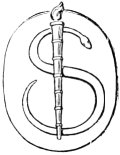
Masonic, Occult and Esoteric Online Library
The Comte De Gabalis
By Abbé N. de Montfaucon de Villars
Saint Paul an Initiate
DISCOURSE II.
 AINT PAUL AN INITIATE. Authority for this statement is found in St. Paul's own I CORINTHIANS, ll., 6, 7. We speak wisdom among the initiated, not the wisdom of this age (but of the life-giving Force), nor of the archons of this age who pass away (but of the archons of the life-giving Force who do not pass away), but we speak the Wisdom of God in a secret made known to the initiated, the wisdom kept secret, which God ordained before the ages for (the upbuilding of) our spiritual body.
AINT PAUL AN INITIATE. Authority for this statement is found in St. Paul's own I CORINTHIANS, ll., 6, 7. We speak wisdom among the initiated, not the wisdom of this age (but of the life-giving Force), nor of the archons of this age who pass away (but of the archons of the life-giving Force who do not pass away), but we speak the Wisdom of God in a secret made known to the initiated, the wisdom kept secret, which God ordained before the ages for (the upbuilding of) our spiritual body.
Σοφ?αν δ? λαλο?μεν ?ν το?ς τελε?οις. We speak wisdom among the initiated,
Bishop Lightfoot states that "τ?λεοις is properly that of which the parts are fully developed. Hence it signifies full-grown,' and accordingly τ?λεοις is used by St. Paul as opposed to ν?πιος. * Pythagoras also is said to have distinguished his disciples as τ?λειοι and ν?πιοι. But besides this meaning of full development,' the term here most probably bears the collateral sense of 'initiated' according to its classical usage, illustrating ?ν μυστηρ?? below.
These words have been the subject of much dispute. On the one hand they have been adduced to justify the distinction of an exoteric and an esoteric dodrine, as though there were certain secrets withheld from the generality. The idea of a higher and a lower teaching seems early to have gained ground even among orthodox writers, and Clement of Alexandria (Eusebius H.E. v. 11) especially says that Christ communicated the inner γν?σις to a few chosen disciples. This distinction became the starting-point of Gnosticism. It is clear from the whole context, especially iii. I, 2, that St. Paul was speaking of an actual distinction in the teaching addressed to the less and the more advanced believer." J. B. LIGHTFOOT, D.D., D.C.L., L.L.D., LORD BISHOP OF DURHAM. EXTRACTS FROM "NOTES ON EPISTLES OF ST. PAUL," FIRST EPISTLE TO THE CORINTHIANS, PAGES 173-4.
σοφ?αν δ? ο? το? α??νος το?του. Not the wisdom of this age,
But the wisdom of the life-giving Breath or Force is here implied. "α??ν is so connected with ?ημι, to breathe, blow, as to denote properly that which causes life, vital force;" (or life-giving Force). * GREEK-ENGLISH LEXICON OF THE NEW TESTAMENT, EDITED BY JOSEPH HENRY THAYER, D.D. PAGE 18. This passage is a subtle play upon words conveying one meaning to the Initiate who has knowledge of the life-giving Force and its manifestation for the uphuilding of man's spiritual body, and quite another to the ordinary hearer for whom the primary significance of the word α??ν has become obliterated through its customary usage with the meaning of age.
ο?δ? τ?ν ?ρχ?ντων το? α??νος το?του τ?ν καταργουμ?νων. Nor of the archons of this age who pass away,
But of the Archons of the life-giving Force who do not pass away is here implied. The Century Dictionary defines archon as "a chief magistrate of some states in ancient Greece, and particularly Athens," and as "In various Gnostic systems, one of several spiritual powers superior to angels, believed to be the rulers of the several heavens." The word archon is here used by St. Paul with double significance. While actually speaking of the Greek magistrates of the period who are uninitiated and therefore ignorant of the mysteries of the life-giving Force, he has in mind those heavenly Archons,or Rulers of this Divine Power.
?λλ? λαλο?μεν θεο? σοφ?αν ?ν μνστηρ??. But we speak the Wisdom of God in a secret made known to the initiated, "μυστ?ριον has its ordinary sense of 'a secret made known to the initiated.'" ARTHUR PENRHYN STANLEY, D.D., DEAN OF WESTMINSTER. "THE EPISTLES OF ST. PAUL TO THE 'CORINTHIANS," PAGE 48, NOTE 7.
τ?ν ?ποκεκρυμμ?νην. The wisdom kept secret, this is the passive of the verb to conceal, to hide or keep secret.
?ν προ?ρισεν, ? θε?ς πρ? τ?ν α??νων. Which God ordained before the ages.
The word α??ν is again used with dual meaning. In its primal sense, as used in the Mysteries, "which God ordained before the life-giving Forces or Breaths," it makes reference to the Cabalistic doari;e of the existence of the Archetypal Plan before its manifestation in Breaths or Emanations.
ε?ς δ?ξαν ?μ?ν. For (the upbuilding of) our spiritual body.
In considering the utterances of St. Paul it is necessary to bear in mind that he was a Jew and a Cabalist, and that he used Greek words rather as translations of the Hebrew words with which he was familiar than in the sense in which they are usually employed by Greek writers. Thus Eis ε?ς δ?ξαν. "δ?ξα. As a translation of the Hebrew, in a use foreign to Greek writing, splendor, brightness; used of the heavenly brightness, by which God was conceived of as surrounded," and here applied to the heavenly brightness by which the God in man is clothed, or the spiritual body. "By which heavenly beings were surrounded when they appeared on earth, with which the face of Moses was once made luminous, and also Christ in his transfiguration, in the Targum and Talmud, Shekinah or Shechinah, the glory of the Lord."
EXTRACTS FROM GREEK-ENGLISH LEXICON OF THE NEW TESTAMENT, PAGE 156.
Footnotes
212:* Infant, little child.
213:* Solar Force.
